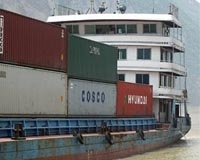| . |  |
. |
Damascus, Syria (UPI) Aug 20, 2009 Amid a worsening Middle East drought, Turkey's cut-off of Euphrates River water to Iraq and Syria was high on the agenda when Iraqi Prime Minister Nouri al-Maliki and Syrian President Bashar Assad met here this week. Water supply, always an important element in this largely arid region, has become a strategic issue for Iraq and Syria since Turkey reduced the flow of the Euphrates to build a series of hydroelectric dams in the impoverished Anatolia region in the southeast. Four years into a drought, Iraq's woes have been compounded by what some officials call an "environmental catastrophe." A plague of unusually severe dust storms is drying up riverbeds and marshes and turning arable land into desert in an area known through the ages as the Fertile Crescent, where the first civilizations arose. Agricultural production has plunged to all-time lows, and Iraq, beset by political feuding and sectarian bloodshed after six years of insurgency, now has to import 80 percent of its food. The Euphrates and the Tigris, both of which rise in Turkey, are among the largest rivers in the Middle East. They flow through Iraq, where they join near Basra in the south to form the Shatt al-Arab waterway that runs into the Persian Gulf. The flow of the Tigris, which runs through Syria, has not been particularly affected by Turkey's ambitious $32 billion Southeast Anatolia Project, known as GAP after its Turkish name Guneydogu Anadolu Projesi. But that does not diminish the fearful impact of the reduction in the Euphrates flow that has soured relations between Turkey, Syria and Iraq, which in the past have competed for regional leadership. The Damascus summit did not announce any agreement between Iraq and Syria on how to get Turkey to increase the Euphrates flow. But Maliki and Assad formed a "high-level strategic cooperation council." It will be headed by the countries' premiers and will meet every six months to cover foreign affairs, defense, finance, economic development and other key issues, such as water resources. Iraqi Water Minister Latif Rashid, who accompanied Maliki to Damascus, last week accused Ankara of breaking a promise to increase the flow of the Euphrates. Turkish Foreign Minister Ahmet Davutoglu had said earlier that Ankara had fulfilled a pledge to boost water flow from 570 cubic meters per second, about half the 2000 level of 950 cubic meters a second, to 715 for July, August and September. Baghdad claims that instead the flow rate was reduced to around only 250 cubic meters a second, one-quarter of the minimum required by Iraq for irrigation. Under GAP, Turkey is building 22 dams and huge reservoirs, with 19 hydroelectric power plants, along the fabled rivers in nine of Turkey's poorest provinces. The $32 billion project is the centerpiece of Turkey's development plans. It was started in the 1980s and is scheduled for completion in 2013. It will generate 7,400 megawatts of electricity and 22 percent of Turkey's energy, and irrigate 4.2 million acres of land for crops, an economic transformation that should turn a virtual dustbowl into a major granary. The water issue is becoming an increasingly important political hot potato between Iraq and Turkey, its northern neighbor. Relations between them had improved after Saddam Hussein was toppled in the U.S.-led invasion of March 2003. But plans by Iraq's restive Kurds to establish their own state in northeastern Iraq have badly strained relations. Turkey fears that will galvanize its own rebellious Kurdish minority in their two-decade-old armed struggle for autonomy. Indeed, Turkey's promise to release more Euphrates water for its drought-ravaged neighbor was accompanied by Baghdad announcing plans to crack down on Kurdish rebels on the border with Turkey. But that is easier said than done. Maliki needs the Kurds as allies as he struggles to forge post-Saddam Iraq into a federal state at a time when U.S. forces are being withdrawn. Moving against the Iraqi Kurds' brethren would put that vital alliance in severe jeopardy at a critical time in Iraq's reconstruction. Turkey is also one of Iraq's main trading partners. Ankara's strategic leverage is magnified by the fact that one-fifth of Iraq's oil exports from its northern oil fields around Kirkuk, 400,000 barrels per day, run through twin pipelines to the Turkish port of Ceyhan in the Eastern Mediterranean. Share This Article With Planet Earth
Related Links Water News - Science, Technology and Politics
 Over 8,000 boats stranded on China river: state media
Over 8,000 boats stranded on China river: state mediaBeijing (AFP) Aug 18, 2009 More than 8,000 cargo ships and boats were stuck on a river in east China in the worst bottleneck in a decade, after water levels rose to a record high due to Typhoon Morakot, state media said Tuesday. The boat traffic jam on the river that links cities in Zhejiang province to Shanghai -- the world's busiest port by total cargo volume -- was 40 kilometres (25 miles) long, the official Xinhua ... read more |
|
| The content herein, unless otherwise known to be public domain, are Copyright 1995-2009 - SpaceDaily. AFP and UPI Wire Stories are copyright Agence France-Presse and United Press International. ESA Portal Reports are copyright European Space Agency. All NASA sourced material is public domain. Additional copyrights may apply in whole or part to other bona fide parties. Advertising does not imply endorsement,agreement or approval of any opinions, statements or information provided by SpaceDaily on any Web page published or hosted by SpaceDaily. Privacy Statement |